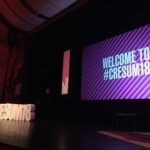 Had the pleasure and honor to stand on the #Cresum18 scene the other day. The Creative summit is a “mixture of a conference, workshop, party and some very secret ingredients that we are not allowed to mention. We have been around since way back in 2007. Older than most of the ideas, innovations, technology and businesses that we usually share ideas around. It all takes place under the midnight sun in the north of Sweden.” (https://www.creativesummit.org) Together with a bunch of extremely interesting we talked about the future of work. While they had a positive tone to it, I could not avoid to nuance it slightly, suggesting that the current trend in society may foster more boredom, less engagement and more problems for any type of organization. And yes, it was indeed a good party too!
Had the pleasure and honor to stand on the #Cresum18 scene the other day. The Creative summit is a “mixture of a conference, workshop, party and some very secret ingredients that we are not allowed to mention. We have been around since way back in 2007. Older than most of the ideas, innovations, technology and businesses that we usually share ideas around. It all takes place under the midnight sun in the north of Sweden.” (https://www.creativesummit.org) Together with a bunch of extremely interesting we talked about the future of work. While they had a positive tone to it, I could not avoid to nuance it slightly, suggesting that the current trend in society may foster more boredom, less engagement and more problems for any type of organization. And yes, it was indeed a good party too!
Presenting the Annals paper on extreme contexts at the R3 research seminar
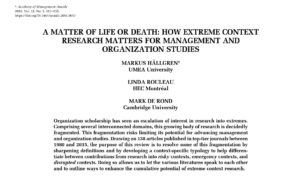 The R3 research group stands for Risk, Resilience and Reliability. It is a newly formed interdisciplinary network that currently is organized by Amy Fraher and Mark Hall at Birmingham University. I was invited to present my, Linda Rouleau´s and Mark de Rond´s Annals paper on extreme contexts. It was a great seminar with plenty of interesting thoughts and discussions following presentations by senior and junior scholars alike.
The R3 research group stands for Risk, Resilience and Reliability. It is a newly formed interdisciplinary network that currently is organized by Amy Fraher and Mark Hall at Birmingham University. I was invited to present my, Linda Rouleau´s and Mark de Rond´s Annals paper on extreme contexts. It was a great seminar with plenty of interesting thoughts and discussions following presentations by senior and junior scholars alike.
Småstolt…
Fick det här mailet idag från en gammal student; “Jag vill tacka dig för alla tips du gav oss, att startskottet för denna resa blev project management-kursen som jag läste i höstas och att jag nu står här med anställning och ett examensarbete som varit till stor nytta både för oss som “forskare” men också för företaget som verkligen implementerat flera av våra lösningar eller planerar att göra det.” 🙂
Känns bra när undervisningen verkligen går bortom den enskilda kursen och omsätts i praktik för både student och organisation.
Rantatalo, Lindberg, Kihlberg & Hällgren – Negotiations and Research Bargains: Bending Professional Norms in the Effort to Gain Field Access
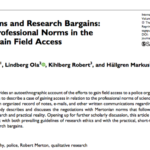 This morning Ola received the news that our paper is available to everyone. The paper is published on an “open access” basis and as a consequence open to anyone! It details the methodological struggles that we have had with one of our projects, and the kind of challenges and opportunities that arose from those – and how we navigated the treacherous waters.
This morning Ola received the news that our paper is available to everyone. The paper is published on an “open access” basis and as a consequence open to anyone! It details the methodological struggles that we have had with one of our projects, and the kind of challenges and opportunities that arose from those – and how we navigated the treacherous waters.
You find the paper here
Abstract
The present study provides an autoethnographic account of the efforts to gain field access to a police organization, spanning more than 2 years. The aim is to describe a case of gaining access in relation to the professional norms of science put forward by Robert K. Merton. Aided by an organized record of notes, e-mails, and other written communications regarding access (144 memos of various types), the study describes and discusses the negotiations with Mertonian norms that followed from the dissonance between ideals of research and practical reality. Opening up for further scholarly discussion, this article concludes that Merton’s norms are incongruent with both prevailing guidelines of research ethics and with the practical, short-term problems of access negotiations and research bargains.
Former student of mine receive the project thesis of the year award from Svenska Projektakademin
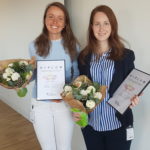 Proud to say that although I was not involved in the supervision of the thesis (but TripleEd member Ulrica Nyhlen was!) it was a former student of mine that received the award. Apparently I had a small part in it by evoking her interest for projects. Is there a better acknowledgment? Here is the news!
Proud to say that although I was not involved in the supervision of the thesis (but TripleEd member Ulrica Nyhlen was!) it was a former student of mine that received the award. Apparently I had a small part in it by evoking her interest for projects. Is there a better acknowledgment? Here is the news!
Radio again; 11th of April 1954 the most boring day
Talking boredom, engagement and motivation with a large multinational company
Had the pleasure to spend a full day together with a large multinational company and two of their developer teams. The time was limited but nevertheless rewarding and interesting. Next step is to see how this embryo of collaboration could be taken to the next level. Pretty fantastic to see, once again, how applicable our extreme context research are to what we commonly refer to quite ordinary organizations. Exciting times ahead!
Teaching project management to the Swedish police
The other week I had the pleasure and honor of teaching 16 managers within the Swedish police basic project management techniques. Rather than merely focusing on how to do it, we explored the consequences of the organizational form and how that may influence the individual, the project and the organization. Moreover we situated the project within the larger organization discussing and working with the challenges that follow when there is multiple projects at the same time. All in all, three full days of executive teaching and great fun!
“A Matter of Life or Death: How Extreme Context Research Matters for Management and Organization Studies” now published in Academy of Management Annals
 The other day Linda Rouleau, Mark de Rond and mine paper “A Matter of Life or Death: How Extreme Context Research Matters for Management and Organization Studies” was published in the Academy of Management Annals journal. It was a lot of hard work so they are really pleased to finally see it in print. Hopefully it will make a difference in how we conceptualize, theorize and approach extreme contexts in the future. Naturally I am kind of happy about this and somewhat proud..
The other day Linda Rouleau, Mark de Rond and mine paper “A Matter of Life or Death: How Extreme Context Research Matters for Management and Organization Studies” was published in the Academy of Management Annals journal. It was a lot of hard work so they are really pleased to finally see it in print. Hopefully it will make a difference in how we conceptualize, theorize and approach extreme contexts in the future. Naturally I am kind of happy about this and somewhat proud..
You find the article here or you can email me on markus.hallgren(at)umu.se if you´d like a copy. Please share with others that you think might be interested!
Abstract
Organization scholarship has seen an escalation of interest in research into extremes. Comprising several interconnected domains, this growing body of research is decidedly fragmented. This fragmentation risks limiting its potential for advancing management and organization studies. Drawing on 138 articles published in top-tier journals between 1980 and 2015, the purpose of this review is to resolve some of this fragmentation by sharpening definitions and by developing a context-specific typology to help differentiate between contributions from research into risky contexts, emergency contexts, and disrupted contexts. Doing so allows us to let the various literatures speak to each other and to outline ways to enhance the cumulative potential of extreme context research.
Intervjuad av P4 Karlavagnen om Tristess
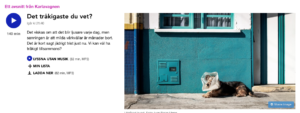 Igårkväll hade P4 ett inslag om tristess i våra liv. Markus hade förmånen att bli intervjuad om insikterna om hur expeditioner på Mount Everest hanterar det. http://t.sr.se/2ERBE4k
Igårkväll hade P4 ett inslag om tristess i våra liv. Markus hade förmånen att bli intervjuad om insikterna om hur expeditioner på Mount Everest hanterar det. http://t.sr.se/2ERBE4k